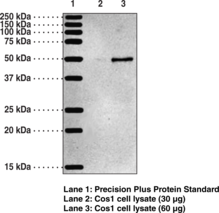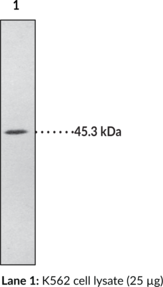Description
Proprotein convertase subtilisin kexin 9 (PCSK9) is a member of the subtilisin serine protease family with an important role in lipoprotein metabolism.{13178} Mutation in the PCSK9 gene is associated with autosomal dominant hypercholesterolemia which is characterized by an increase in low density lipoprotein (LDL) cholesterol levels.{13158} PCSK9 overexpression in wild-type mice doubles the plasma total cholesterol, possibly through acceleration of the degradation of the LDL receptor.{13176,13178} PCSK9 mRNA is detected in various tissues such as liver, kidney, lung, spleen, jejunum, ileum, colon, and muscle with the highest expression in the liver.{13136} Human PCSK9 precursor is 692 amino acids in length with an estimated molecular weight of 74 kDa. This proprotein is self-cleaved to form a mature protein at around 63 kDa in the golgi.{13177} Cayman’s PCSK9 polyclonal antibody detects mainly the mature form of the protein ranging from 62-66 kDa in tissues and cells such as liver, kidney, and colon cancer cells.
Synonyms: NARC-1|Proprotein Convertase Subtilisin Kexin 9
Immunogen: Synthetic peptide from an internal region of human PCSK9
Formulation: 500 μl of Peptide affinity-purified antibody
Isotype:
Applications: IF and WB
Origin: Animal/Rabbit
Stability: 365 days
Application|Immunofluorescence||Application|Western Blot||Product Type|Antibodies|Polyclonal Antibodies||Research Area|Cardiovascular System|Lipids & Lipoproteins|Lipoproteins||Research Area|Endocrinology & Metabolism|Metabolic Diseases|Dyslipidemias||Research Area|Neuroscience|Neurodegenerative Disorders|Alzheimer’s Disease




